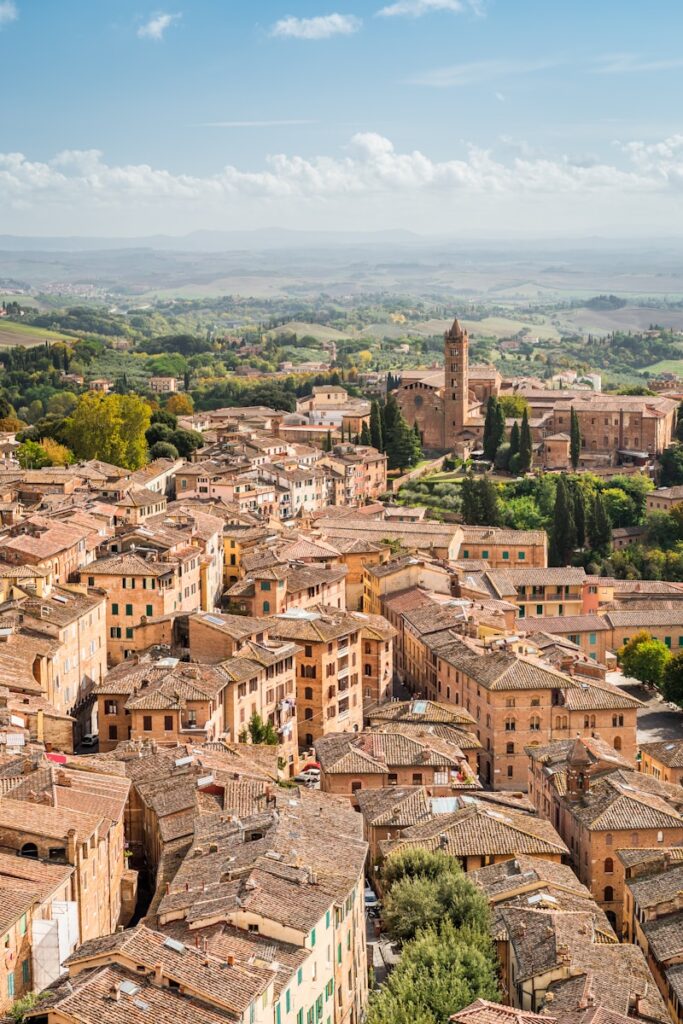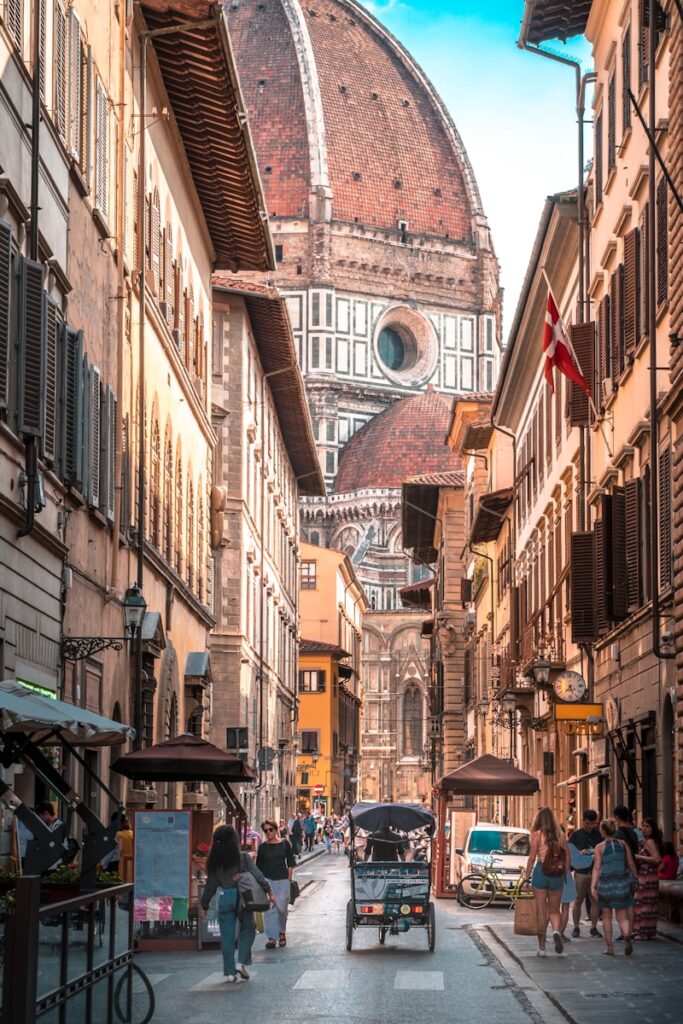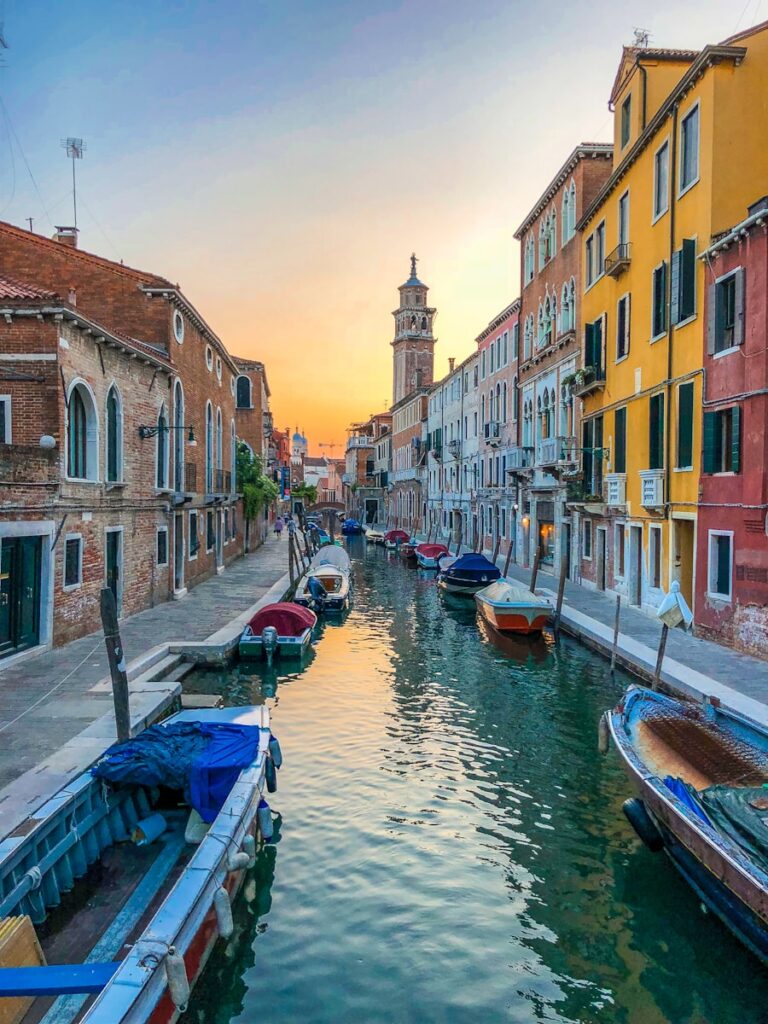Moving to Italy: Everything You Need to Know
Coming up: life hacks, pro-tips, temperatures and terrains, some boring bureaucracy, lots of pizza and pasta, and everything you’ve ever wanted to know about moving to Italy
So… you’re thinking of moving to Italy.
Here’s our opinion: you’re making a good choice.
One of Europe’s most appealing relocation hubs, around 5.2 million* of the nation’s inhabitants come from somewhere outside Italy.
(*which is just under 10%, if you’re reeeaally interested in stats)
Big reasons for moving to Italy include: good weather, diverse landscapes, lots of beaches, a Mediterranean climate (well, in some parts of the country), a relatively low cost of living, some of the most historical places on the planet, and what might just be the world’s best food.
But which visa do you need? Which city should you move to? Do you need to learn Italian? Is it safe? How can you find a nice place to live? And just how many hypothetical questions can one person ask in the introduction to an article?
Coming up, all that and more: today, Homelike are bringing you everything you need to know about moving to Italy.
Grab your suitcase and come join the fun!
Why relocate to Italy?
The biggest perks of relocating to Italy include:
- Endless culture: one of the most history-packed places on the planet, Italy offers ancient architecture, Roman sites, mythical stories, religious places, world-class museums, and some of the world’s most historic cities.
- A huge amount of variety: you get mountains (including the Alps and the Dolomites), one of the longest coastlines in Europe, over 450 islands, some of the planet’s most well-known cities, and lots of frozen-in-time little villages.
- A central location: after relocating to Italy, you have good access to the rest of Europe. You get land borders with 6 other places, along with international ferries, good proximity to the rest of Europe, and 9 major international airports.
- Endless outdoor adventures: in addition to all the beaches and mountains, you also get many waymarked hiking trails (both long and short)—and 3 of Europe’s official Eurovelo cycling routes head through the nation.
- Food! If you’re moving to Italy, you’re in for some of the planet’s tastiest treats. Is Italian food the best in the world? Possibly—we’ve covered more detail soon.
- Excellent infrastructure and amenities: great for relocating to Italy with family. Italy offers good healthcare and education, along with modern cities, great public transport, an excellent work-life balance, and some of the planet’s best infrastructure..
- Great art and architecture: you’ll find ancient architecture, some of the most famous buildings on the planet, and thousands of art galleries.
Just so you don’t think we’re biased, some of the cons of moving to Italy include…
… language barriers (many Italian people don’t speak English, especially in rural places), lots of tourists, slow bureaucracy, and a high unemployment rate (currently sitting at around 8%).
But, overall, the high points of moving to Italy definitely outweigh the low points!

Do I need a visa to live in Italy?
If you’re moving to Italy from another part of the EU/EEA area, you DON’T need a visa. You will need to register for residency (which everyone needs to do—more on that later). And after that, you can stay in Italy long-term if you’re moving to study or work—or if you have enough cash in the bank to sustain you and your family for your stay.
If you’re moving to Italy from a nation outside the EU/EEA area, you WILL need a visa*. There are many different types available (work visas, self-employment visas, a retirement visa, student visas, investment visas, and more—but, at present, no digital nomad visa).
After you’re granted whichever visa you apply for, you then need to get your residence permit (again, more on that soon).
*All this said, many nationalities (including those from the UK, US, Singapore and Japan) can visit Italy for 90 days with no visa. So if you’re only relocating to Italy for a short while, you might need no visa at all! Here are the 50+ nations who qualify.
To be clear: if you’re from the UK, you can stay in Italy for up to 90 days visa-free—but after that, you’ll need one of the visas we’ve listed above. Here’s more information specific to people with a UK passport.
Should I learn Italian for relocating to Italy?
If you’re moving to Italy for more than a few months, you should learn Italian.
Firstly, it’s polite and respectful.
Secondly, English levels in Italy aren’t as high as some newbies expect—only around one-third of Italy’s total population speaks English.
And on top of all that, daily life will be easier. You’ll make more friends, you’ll be able to communicate with EVERYBODY, bureaucracy and shopping will become more simple, and you’ll be able to better understand context and culture.
To get started, download the fun and easy-to-use Duolingo. Once you’re ready to move onto something a bit more structured and comprehensive, your best options are Babbel and Rosetta Stone.
For something a bit different, check out:
- Italian Mastery (a great YouTube channel)
- The unique Italian Experiment (offering stories, courses, and themed lessons)
- One World Italiano (an Italian-specific language school with a range of varied resources)
- … and in-person language classes in whichever city you’re living in (also a good way to make foreign friends!)

How much does living in Italy cost?
After moving to Italy, here are the types of prices you can expect:
- 1-bedroom apartment in the city center: €783
- 1-bedroom apartment outside the city center: €582
- 3-bedroom apartment in the city center: €1,414
- 3-bedroom apartment outside the city center: €980
- One-way ticket on local public transport: €1.70
- Regular monthly pass for local public transport: €35
- Meal for 1 at an inexpensive restaurant: €15
- 3-course meal for 2 people at a mid-range restaurant: €60
- Large draught domestic beer in a bar or restaurant: €5
- Regular cappuccino in a cafe or restaurant: €1.58
- Regular liter of milk from a supermarket: €1.46
- 12 regular eggs from a supermarket: €3.44
- 1kg of local cheese from a supermarket: €13.09
- 1kg of chicken breast filets from a supermarket: €10.65
We’ve taken all numbers from Numbeo, where you can find accurate crowd-sourced cost-of-living stats for pretty much any place on the planet.
(Note: of course, prices vary from city to city. Broadly speaking, the more touristy a place is, the higher the prices will be. Places such as Milan and Rome are more expensive, while smaller cities like Palermo, Bergamo and Bari are a bit more affordable).
How can I find a place to live in Italy?
As you’ve probably noticed by now, moving to Italy has many perks.
… and because there are many perks of moving to Italy, more newcomers are flocking to the place.
So: it’s now tougher than before to find a place to live. You have more competition, the prices are a little higher, many local landlords don’t speak English (and some of those who do speak English will try to rip you off), some apartments come completely unfurnished, and you often need to spend many hours negotiating, viewing, and messaging landlords.
For all those reasons, many Italy newcomers move into serviced apartments (especially in the short-term). And many of them choose us—all of our serviced apartments are fully-furnished, fairly-priced, lovely for both living and working, and ready to move into right now. A nice way to cut out all the stress and fuss!
(that said, if you want to do things without our help, the best sites are immobiliare.it, idealista.it, and casa.it—while good ol’ Facebook also has many real-estate groups throughout Italy).
If you want to buy a home, you can use the same websites we’ve just mentioned. BUT… buying can be complex and stressful, so we recommend working with an agent (as they can help with bureaucracy, language barriers, and any potential complications).

Understanding residency registration in Italy
ALL foreigners who intend on staying in the nation longer than 90 days need to register their residence in Italy (even if you’re moving to Italy from another part of the EU).
To do so, there are two stages to the process:
- Visit your local police station (‘Questura,’ in Italian) within 8 days of arriving in whichever city you’ll be living
- Visit your local registry office (‘Anagrafe,’ in Italian) within 90 days of arriving in that city
(To complete this application, you need to provide an address, even if it’s a short-term place—another good reason to move into a serviced apartment)
This residence registration is a legal requirement—and if you don’t get your residence permit (or ‘residence card,’ as some people prefer to call it), you won’t be able to access Italy’s healthcare, education, and social security systems.
What's the healthcare system like in Italy?
Italy’s healthcare system is good, but not world class: in the FREOPP 2021 World Index for Healthcare Innovation report, the nation came 28th in the world for its overall healthcare.
The nation’s healthcare offers both public and private options:
To use the public healthcare system (or ‘Servizio Sanitario Nazionale,’ or ‘SSN’), you’ll need to get a National Health Card (‘tessera sanitaria’). You do that by completing an application at your local health care center (‘Azienda Sanitaria Locale,’ or ‘ASL’). The public healthcare system is largely free to access, but it’s paid for by taxes.
To use the nation’s private healthcare system (which is better, more efficient, and of higher quality), you’ll need to get private health insurance in Italy. Any of the well-known trusted names—like AXA and Cigna—are good places to start your search.
What should I know about the Italian education system?
In Italy, education is mandatory from the ages of 6 to 16.
And it’s split up as follows:
- Preschool/nursery: 3-6
- Primary education: 6-11
- Lower secondary education: 11-14
- Upper secondary education: 14-19
After moving to Italy, you’ll find both international schools (where classes are taught in a foreign language; usually English), and standard Italian-speaking schools.
If you want more choice of large high-quality international schools, it’s best to move to one of Italy’s biggest cities (like Rome, Milan, and Naples).
Good news: Italy’s education is excellent—in a 2021 ‘Best Countries Report,’ Italy came 14th in the world for education.
And more good news (this time for college-age students): 6 of Italy’s universities have been ranked among the 200 best in the world.
How do I find a job after relocating to Italy?
The best websites for finding a job after moving to Italy are Indeed, Ticonsiglio.com, jooble.org, and LinkedIn. Your chances of getting a good job are WAY higher if you speak Italian.
If you’re relocating to Italy from another part of western Europe, you might find the salaries quite low. Across the nation, average salaries sit at around €31,500 per year. Broadly speaking, wages are higher in the north and the center, compared to the south.
Because it’s a developed country with a large economy, you’ll find all types of jobs in Italy—but the nation’s biggest industries include tourism, manufacturing, and agriculture.
How can I open a bank account after moving to Italy?
We recommend opening an account with an online bank, such as N26 or Wise. With these, you download the app, you upload your details, and you have a ready-to-use account in minutes. Easy!
That said, if you want to open a ‘traditional’ in-person account after moving to Italy, the most popular options are Intesa Sanpaolo, UniCredit, and Poste Italiane.
To open a bank account (whether it’s online or offline), you usually need a valid photo ID, your ‘codice fiscale’ (also known as your ‘Tax Identification Number’ or ‘TIN,’ more on that in a sec), proof of address, and your residence permit.
What is an Italian tax code number?
Your Italian tax code number is your ‘codice fiscale’—and you need it to work, pay taxes, and even rent a property from a local landlord for more than 30 days.
After relocating to Italy, you get your codice fiscale by:
- If you’re an EU citizen, head to your nearest Italian Revenue Agency office in Italy, or your nearest Italian embassy or consulate in your home country. All you need to take with you is a passport.
- If you’re not an EU citizen, head to your local police headquarters in whichever city you’ve moved to, or your local ‘Single Desk for Immigration’ (known as ‘Sportelli Unici per l’immigrazione’ in Italian)—again, in whichever city you’ve moved to. You only need your passport, but you should also take your residence permit (if you have it) just in case.
What should I know about transport in Italy?
After moving to Italy, you’ll find great public transport—both within cities, and to get between cities. You get:
- Over 2,000 train stations across the country (the Trainline is the best place to buy tickets, compare prices, and find cheap deals)
- Many long-distance bus companies, including Marozzi and Omnio (a great way to travel long distances affordably, and with a surprising amount of comfort)
- More than 40 airports, offering both domestic and international connections (the biggest and busiest airports are those in Rome, Milan, Naples, and Bergamo)
Cycling isn’t hugely popular, but it’s becoming more common in the nation’s bigger cities. Milan is the nation’s most bike-friendly city (with over 300 km/180 miles of bike paths)—while Turin, Florence and Bologna are also popular with cyclists.
Though you can reach all big places (and many small places) by bus and train, some of the nation’s more rural pockets are inaccessible without a car (especially in the far north and on some of the islands).
… in Italy, you drive on the right. Compared to most other western-European nations, drivers are a bit more reckless and careless here, but driving is still pretty safe.

What should I know about Italian food?
After relocating to Italy, you’ll probably spend a LOT of time chewing and chomping.
You already know the big classics—like pasta, pizza, gelato, tiramisu, and Italian coffee.
But the nation’s cuisine is WAY more diverse than most people expect. It includes soups, polenta, cured meats, over 2,500 varieties of cheese, and a massive range of fruits and vegetables (because of the climate in the nation’s south, lots of fresh fruits and vegetables grow here).
… and you’ll also find that food is WAY more regional than most newcomers expect. For example:
In the south, you’ll find more seafood, thicker pizzas, and a huge amount of fruits and vegetables. But in the north, dishes are richer, and heavier—and share some similarities with German food. And pasta isn’t the only big carb here—in the north, potatoes are very popular, while risotto and other rice-based dishes are popular in the northwest.
Top tip: a traditional Italian dinner is bigger than most people expect, and is usually made up of many courses. Often, pasta is the before-main course (not the actual main course!).
What can I expect from Italian weather?
Yep, Italy is known for being warm.
… but the nation’s weather is more than just ‘warm everywhere all the time.’
And because Italy’s geography is so diverse, so are its temperatures.
Broadly, after moving to Italy, here’s what you’ll find:
- In the north, you’ll find more mountains. Summers are hot (average high temperature in July and August typically reach around 85°F (29°C). But winters can be cold, and snow is very common—even in the northern cities (like Milan and Bergamo), winter temperatures can drop below freezing.
- In the south, you get a Mediterranean climate, which means warm, dry summers, and not-too-cold winters. In Naples, for example, average January and February temperatures usually sit at around 49°F (9.5°C). This Mediterranean climate also stretches to central parts of the nation.
… overall though, you can expect good weather, lots of sunshine, and some great long days (with almost 15 hours of daylight during summer in some cities).
What are the best places to live in Italy?
After relocating to Italy, some of your best options are:
- Rome: because it’s the capital, Rome is often the logical choice. You get endless historical sights, people from all over the planet (around 12% of the city’s population is made up of non-Italians), lots of things to do, the nation’s most cosmopolitan vibe, and a massive international airport (with direct connections to more than 250 other cities).
- Milan: another popular choice with expats moving to Italy, around 20% of the people living in Milan come from outside Italy. Other perks include high-end hangouts, close proximity to other nations, many international schools, and lots of very-nearby outdoor adventures.
- Florence: widely known for being one of the prettiest and most livable cities in Italy, Florence feels like some sort of giant art museum. And because it sits in the middle of the nation, it’s well-located for exploring (and moving to) other parts of Italy. If you’re relocating to Italy for real local vibes, it’s an ideal option.
- Bolzano: a lesser-known option, this pricey city sits in the Alps. Consistently ranked as one of the best places in Italy for quality of life, it offers clean air, excellent hikes, a unique identity (people speak both Italian and German), and top-class public transport. If you like small mountain towns, you’ll love it.
- Naples: cheaper than Rome, Milan and Florence, Naples is one of the most densely-populated cities in Europe. If you like busy bustle, you’ll love it; if you don’t, you won’t. If you’re moving to Italy for retro vibes, it’s a great choice—of all the big cities in Italy, this one feels the most traditional.
- Turin: another affordable option, and another traditional-style option. You won’t find many expats here, but you will find a small city, elegant streets, a high quality of life, lots of nearby mountains, and many great green spaces. If you’re going to live here, you should DEFINITELY learn Italian.
Is Italy pet-friendly?
If you’re relocating to Italy with a pet, good news:
As you can see here, “Italy is one of the most pet-friendly countries in Europe”—and around 40% of Italian households are home to a pet.
You can take pets in many cafes and restaurants (including, of course, all the terraces and outdoor areas, which are very common in Italy)—while lots of tourist attractions and forms of public transport are pet-friendly.
But if you’re relocating to Italy with your little furry friend, there are some rules and regulations you need to follow. Including: they need to be microchipped, they need to be vaccinated against rabies, and you can’t take more than five pets per person.
What are some Italian festivals and holidays?
After moving to Italy, you’ll find a bunch of events, festivals and holidays. Some of the biggest include:
- Carnevale: an Easter-related festival, this once-pagan celebration is all about pre-Lent indulgence. Expect masks, parades, rich food, and lots of confetti. The most well-known of them all is the Carnival of Venice.
- Palio di Siena: a twice-a-year horse race, this sees riders from different Italian areas compete for regional pride. Expect old-school clothes, unusual food, and age-old traditions. Rick Steves called it “the world’s most insane horse race.”
- The Battle of Oranges: part of The Carnival of Ivrea, this three-day weird-fest involves a big food fight (where, as you probably guessed, people throw oranges at each other). Sort of like Italy’s version of Spain’s La Tomatina.
… you’ll also find many religious festivals (including Christmas, Easter, saints’ days, and some lesser-known events).
But, because we now live in the 21st century, you’ll also find a packed calendar of nightlife events, music festivals, and other modern stuff. Here’s a regularly-updated list.
Is Italy safe?
Overall, yes: relocating to Italy is safe.
Though scams and pickpocketing are common in some touristy areas, there’s little chance of serious crime, violent crime, or terrorism.
Avalances frequently occur in some of the most mountainous areas… but you won’t get any other types of natural disasters in any other parts of the nation.
In case you’re particularly cautious: Florence and Milan are two of the nation’s safest cities.
What should I know about internet in Italy?
Compared to most of western Europe, Italy’s internet isn’t great—but it’s improving (average broadband speeds sit at around 74 Mbps, and 5G is now pretty widespread).
… so Italian internet is more than good enough for daily life.
The nation’s best internet service providers are Telecom Italia (TIM), Iliad, and Vodafone. You’ll typically pay around €25-30 per month for unlimited home broadband, and around €10-15 per month for 10GB (plus calls) for your mobile phone.
Where can I shop for groceries and other items after moving to Italy?
After moving to Italy, most newcomers fall in love with the nation’s shopping culture:
Many Italian people still buy their foods from local independent sellers (bread from the baker, fruits and vegetables from the grocer, meat from the butcher, etc).
… and if you want the best produce and prices, that’s what you should do too.
That said, you’ll also (of course) find many ‘normal’ supermarkets, where you can buy everything you need in one big shop. The most well-known names are Conad, Selex, Végé, Aldi and Lidl—but different names are popular in different regions (where you’ll shop is surprisingly regional in Italy).
Bigger supermarkets are usually closed on Sunday afternoons—and typically sit outside the center of big cities. Many of the larger supermarkets will also stock the everyday household stuff you need (cleaning products, toiletries, small appliances, etc).
Moving to Italy from the US
If you’re relocating to Italy from the US, you can stay for 90 days with no visa. For stays any longer, you’ll need to apply for the relevant visa (as outlined above!)
Here are some cultural differences you can expect:
- More affordable healthcare
- Much better public transport
- Air conditioning is pretty rare
- Everything is smaller—cafes, streets, cars
- Tipping isn’t expected, but is appreciated (around 10% is right)
- Drinking alcohol in public (in streets and in parks, for example) is much more common
Moving to Italy from the UK
If you’re relocating to Italy from the UK, you can stay for 90 days with no visa—but will need the relevant visa for any longer stays.
Cultural differences you can expect after moving to Italy:
- Much better food
- Everything is more affordable
- Smoking is much more common in Italy
- Italian people are more direct than UK people
- Life has a slower pace, and people are more relaxed
- Long-distance public transport (especially trains) are more reliable
- People are more sociable—everyone talks to everyone, and people place a big emphasis on spending time with friends and family
Everything you need to know about moving to Italy: final thoughts
And we’re done! That’s everything you need to know about relocating to Italy.
As we’ve (hopefully!) made clear by now, it’s a lovely place to live:
You get good weather, great food, friendly people, massively-diverse landscapes, and a reasonable cost of living (for western-European standards, anyway).
… but, as we covered, one of the toughest parts of moving to Italy is finding a good apartment. The rental market is tricky and confusing, local people have an advantage over you, landlords often try to over-charge foreigners, some apartments come completely unfurnished, and you usually need to spend many hours viewing and negotiating (which is especially inconvenient when you’ve only just moved to the place).
So: many non-locals (especially in the short-term) move into serviced apartments. Ours are fully-furnished, ready to move into today, and comfy for both working and living. And because we list all prices on our site, you don’t have to worry about negotiating, bargaining, or being ripped off.
Anyway, wherever you live, we reckon you’ll love living in Italy: and we massively recommend it!
Thanks for reading, thanks for choosing Homelike, and enjoy living in Italy. Ciao for now!






















